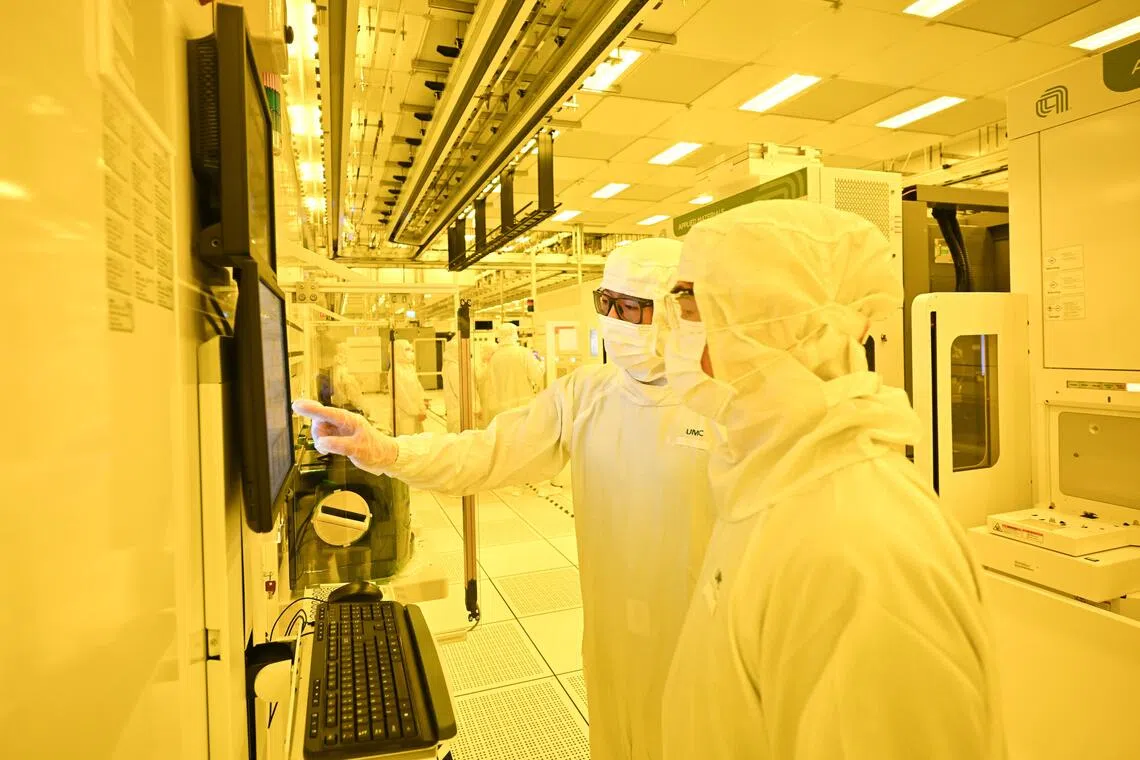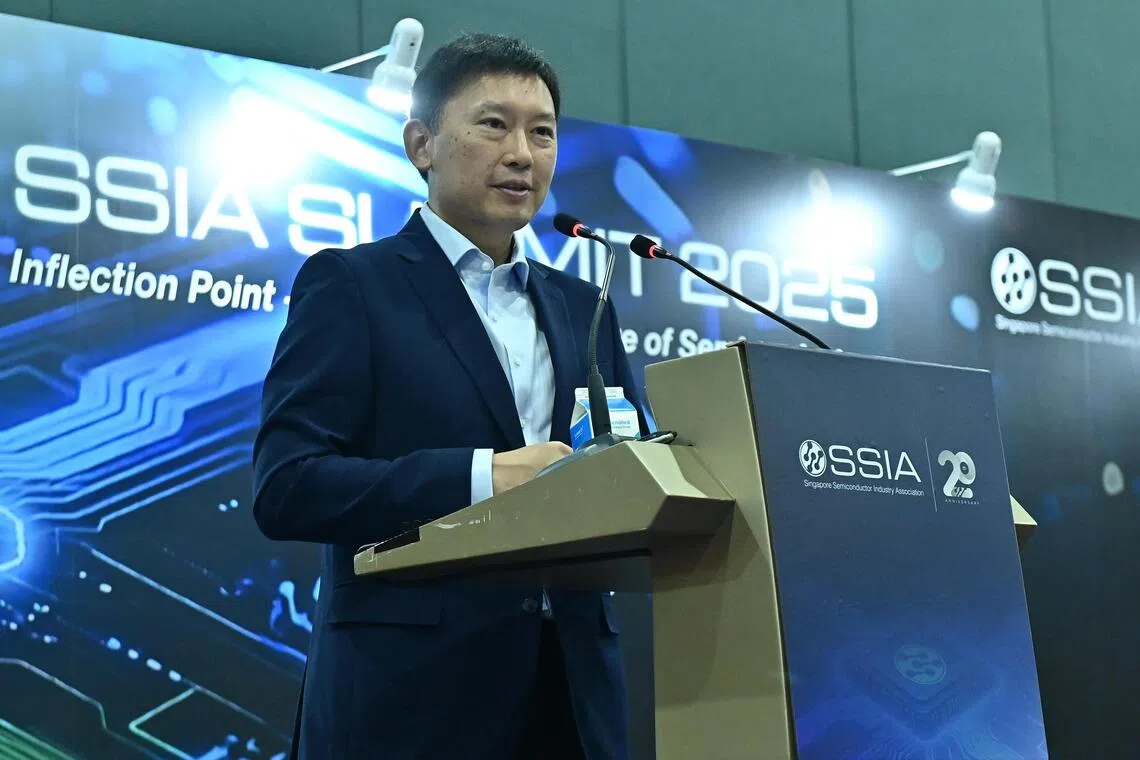S’pore’s semiconductor, electronics sector needs to stay agile amid tech disruptions: Chee Hong Tat
Sign up now: Get ST's newsletters delivered to your inbox

SSIA has reskilled more than 2,700 mid-career professionals into semiconductor roles through Career Conversion Programmes.
PHOTO: ST FILE
Follow topic:
SINGAPORE - Singapore’s semiconductor and electronics industry must stay agile and innovative as it adapts to disruptions from artificial intelligence (AI) and the rising demand for more powerful chips for electric vehicles and advanced computing.
This will help the Republic ride the wave of technological change instead of being swept along, and stay competitive as a safe, reliable and trusted node in the global value chain, said Minister for National Development Chee Hong Tat on Sept 24.
“While the global semiconductor sector is experiencing a surge in demand, it is also grappling with rapid technological disruption – from the way AI has redefined chip design and digital fabrication to how quantum technologies have unlocked the next frontier of computing,” he said.
“The industry is also undergoing significant transformation, with the rise of wide bandgap semiconductors that provide higher energy efficiency and greater power density.”
Speaking at the Singapore Semiconductor Industry Association (SSIA) Summit held at Resorts World Sentosa, Mr Chee said the industry must keep building capabilities and developing its workforce so it can meet these challenges.
“We must not forget the importance of developing our people, from the worker on the factory floor to the engineer developing the next chip design,” the minister said.
“The semiconductor and electronics industry is one of the leading sectors in this area, offering meaningful careers and upskilling opportunities – it also gives mid-career professionals the chance to reskill, grow and thrive in new roles.”
Mr Chee noted that SSIA already conducts outreach to raise awareness and attract students to the sector, and trains and nurtures engineers, senior executives and leaders through various programmes.
For example, SSIA has reskilled more than 2,700 mid-career professionals into semiconductor roles through Career Conversion Programmes in partnership with Workforce Singapore.
“These programmes provide salary support, flexibility across place-and-train and job redesign modes, and SME-centric schemes that help to build leadership, operational and digital capabilities,” said Mr Chee.
“The Government will continue to work closely with SSIA to support the sector, including investing in nurturing talent and developing the workforce,” the minister added.
Mr Chee also noted that strong relationships between companies, unions and workers must continue to be forged to place workers at the heart of this transformation.
Unions “are not simply representatives of our workers, but also strategic partners to associations and businesses – these partnerships are crucial for productive, inclusive and sustainable business transformation”, he said.

Minister for National Development Chee Hong Tat speaking at the Singapore Semiconductor Industry Association Summit at Resorts World Sentosa on Sept 24.
PHOTO: SSIA
For example, the United Workers of Electronics and Electrical Industries (UWEEI) has been actively working with companies here to co-develop workforce transformation plans.
It does this through the Company Training Committee (CTC), which serves as a platform for meaningful labour-management cooperation, and is supported by the National Trades Union Congress’ CTC Grant.
CTCs are a labour movement initiative that brings together firms, unions and employees to identify skills needed for business transformation and to implement tailored training plans.
“When there is close collaboration between associations, companies and unions, it becomes easier to align training programmes with needs on the ground, and foster trust between employers and employees,” said Mr Chee.
He cited chipmaker STMicroelectronics, where about 100 employees – from operators to technicians to engineers – have been upskilled under the CTC’s Career Development Plans.
“STMicroelectronics’ success is testament to the synergies between unions and companies that can drive strategic investment in human capital, and build a resilient, agile workforce, and drive productivity growth,” he said.
SSIA marked the Sept 24 event by signing a memorandum of understanding (MOU) with UWEEI to co-develop training programmes to equip workers with critical skills and keep them future-ready.
About 35,000 workers in the semiconductor and electronics industry are expected to benefit, with more details such as the duration of the programmes to be announced in the coming months.
“This MOU will drive the adoption of Industry 4.0 technologies and sustainable manufacturing practices across companies in the semiconductor value chain,” said Mr Chee, referring to the ongoing automation of traditional manufacturing and industrial practices, using modern and smart technologies.
“This includes equipping workers with the critical skills and competencies to meet future industry needs; promoting progressive workplace practices and harmonious industrial relations to support inclusive and worker-centric transformation; and targeted outreach, especially to students, to raise awareness on the meaningful career opportunities in these sectors.”
SSIA executive director Ang Wee Seng told The Straits Times on Sept 24 that the impact of US tariffs on Singapore’s semiconductor industry remains uncertain for now.
US President Donald Trump had said in August that he would impose a 100 per cent tariff on semiconductor imports
But global semiconductor companies typically prioritise fundamental factors such as ecosystem strength, access to skilled talent, supply chain connectivity and a stable business environment, areas where Singapore continues to stand out and remain attractive to global players.
“Singapore also plays a unique role as a neutral, trusted and globally connected hub.
“In an environment where geopolitical competition is reshaping supply chains, Singapore offers stability, transparency and strong connectivity to Asean and global markets,” said Mr Ang.
“Our outlook is cautiously optimistic – while global headwinds persist, Singapore’s semiconductor ecosystem is resilient and well positioned to capture the next wave of growth,” he said.
At SSIA’s 20th anniversary dinner at Resorts World Sentosa, Minister-in-charge of Energy and Science and Technology Tan See Leng commended the organisation, which has grown from 20 members to more than 300, for its significant contributions in strengthening Singapore’s semiconductor ecosystem.
Dr Tan, who is also Minister for Manpower, said SSIA has helped opened doors for local companies to expand overseas, connecting them to key global players. It also played a crucial role in developing talent for the sector.


